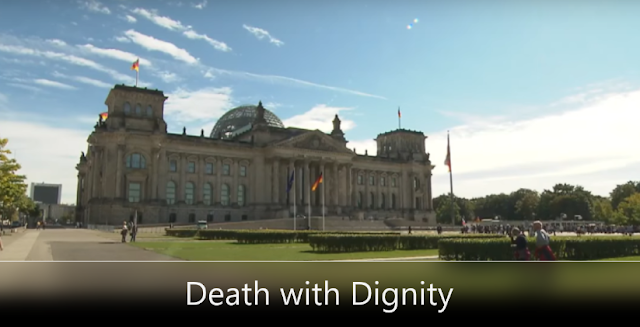British House of Commons Paves Way for Dignified End-of-Life Choice
By a narrow margin but with 314 votes in favor and 291 against, the Parliament has taken a courageous and long overdue step. This paves the way for the right to self-determination and dignity at the end of life—not just for the citizens of the British nation, but also as an inspiration for other countries. (Here is an overview of the legal situation in other countries.)
The bill, introduced by Labour MP Kim Leadbeater, proposes to give terminally ill people in their final stage of life the option to decide autonomously about the timing and circumstances of their death.
This applies under strict conditions:
- The individuals must be terminally ill,
- Have a life expectancy of less than six months, and
- Be able to self-administer the lethal substance.
Additionally, the consent of two doctors and an expert panel is required. This is a law aimed at preventing abuse on the one hand, and alleviating the immeasurable suffering of many people on the other. Currently, the situation is far from the freedom and legalization we have in Germany.
A Beacon of Hope for Those Affected
The discussion around assisted dying has long since transcended national boundaries and has become a question of universal human rights and empathy. Today gives new hope to the millions of people struggling with unbearable suffering and a lack of quality of life.
TV presenter Dame Esther Rantzen, who is suffering from incurable lung cancer and has been a leading advocate for assisted dying regulations, appealed to the members of Parliament before the vote, saying, "All I ask is that we have the dignity of choice" - "All we're asking for is a choice - not to shorten life, but to shorten death," she said. "If life becomes unendurable, shouldn't we have the choice to ask for assistance?"
For people like 82-year-old David Walker, who supported his terminally ill wife for three years in her fight against death, this progress is deeply emotional. "When you have no quality of life, you have nothing," he expressed, echoing what many feel deeply:
No one should be forced to endure a life of unimaginable suffering just because others struggle to recognize the value of self-determination.
David Walker, 82, said he supported changing the law because he saw his wife of 60 years suffer for three years at the end of her life."That's why I'm here, because I can't help her anymore, but I can help other people who are going through the same thing, because if you have no quality of life, you have nothing,"
The Current Legal Situation in England, Wales, and Many Other Countries
The current legal situation in England, Wales, and many other countries - including Germany - often forces people to endure unbearable suffering or travel abroad to die in a dignified manner. Such trips, costing thousands of euros and accompanied by immense emotional stress, are incompatible with the idea of a humane and just society.
Human Dignity at the End of Life: An Indispensable Moral Obligation
The assisted dying debate aims to address a crucial point: respect for the dignity of every individual. It is not about devaluing life, but rather about not prolonging a life of suffering against the will of the affected. The step taken by the British House of Commons sends a strong signal to those still grappling with outdated views or hesitant to embrace new paths due to societal and ethical conflicts. For what could be more humane than entrusting a terminally ill person with the decision about their own life and death?
Opponents of assisted dying (linked text is in german - use your Browser translation for your language) often justify their stance with concerns that legalization could pressure disadvantaged individuals. However, these fears can—and must—be mitigated through responsible regulations, adequate controls, and education. The focus should not be on hypothetical dangers, but on the reality of people living in pain and despair without hope of improvement.
A Momentum for Humanity
Today marks not the end of the discussion but a new beginning, thanks to the British House of Commons—not just for the UK. It is a call to governments everywhere to break painful taboos and fulfill their obligation:
To enable people to live and die with dignity. For true humanity is shown when we respect the will and the suffering of our fellow humans—until the very last moment.
I wrote this article as well in German






Comments
Post a Comment